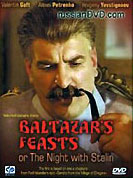Recenzje (3)
From all the perestroika films I had the opportunity to see, Baltazar's Feast, perhaps with the exception of the satirical City of Zero, impressed me the most. It is far more chilling and raw than the much more famous Abuladze's Repentance. After all, the five years that separate both films broke the ice and allowed us to call things by their real names. To truly appreciate this cinematic experience, it is better to be familiar with the historical realities of the Soviet Union and Georgia as the birthplace of Stalin and his closest collaborator Beria, as the film, or rather the literary source, deals with real names and historical events. The film is a perfect example of political will and an analysis of how dictatorships are born and function. Meticulous direction, strong acting performances, and a quality script - what more could one ask for? Overall impression: 95%.
()
Many things could be written given the authors' excellent work with one feast and a few flashbacks: about the paradox that allowed the first socialist country (the most progressive of the era) to revive ancient Byzantine patrimonial practices in only 20 years of existence, practices in which the ruler is the sun – illuminating all with their greatness and to whom all the nation's views and hopes return. Or about how a Georgian terrorist became the ruler of Russia, etc… As a filmmaker and artistic paradox (but let’s be thankful for it), it personally seems to me that, given the mastery of the film's authors and the book source material, the character of Stalin transcends a simple Manichean division of absolute good and evil, day and night. The cruelty remains, but the ambiguity of his gestures, as well as the almost moving (fictionalized, of course) confession and testimony of Stalin's power, make this cruelty believable because it is human. That is because a human is always more of an enigma than an embodiment of a principle (be it evil or something else). The authors managed to create a very grateful paradox for the audience – they faithfully showed Stalin's worst sides but made him into a human being. The exact opposite is achieved in movies like The Fall of Berlin, and so on.
()
A captivating autopsy of the fatality of power, a film that balances on the edge of speculation, but with its image of a feast of the powerful (so popular since ancient times), it reveals one of the possible interpretations of Stalin's personality. A personality who may have found himself in the schizophrenic captivity of contradictory halves – Dzhugashvili, the farmer, and Stalin, a world ruler. And when Koba chose the second, he found himself in the pliers of absolute power, which he himself held in his hands, but which he could not let go of for even a moment. Director Yuri Kara described Stalin as a strange mixture of fragility, quiet madness and brutality (which he himself sees as a necessity of existence), as a manipulator who, in a single word, turns men into ruins and ruins into men. And a feast in his honor, a feast in the middle of the leader's vacation in Abkhazia, provides the perfect space to play a special satirical-tragic game in which nothing seems to happen, but in which everyone's lives are at stake every second (except Stalin's, of course). The Feasts of Valtasar, or The Night with Stalin is a typical example of subsurface drama, where all the tension takes place under the masks of the individual characters, which have a rather caricature nature. Its emotional highlights are magnificent, and the scene of the egg-shooting from the chef's head is one of the best images of power and humiliation I've ever seen in a movie. It is amazing how little means it takes for Kara to express his view of the cursed and adored leader, to spread his vision of the communist apparatus in front of the viewer, the most resentful point of which is not the surprisingly charismatic Stalin, but the sly and spineless pig Berija. I was somewhat taken aback by the narrative aspect of the film, which acts as a "memory" of one of the performers of the feast, but in the process shatters into a typical Russian polyphony of views. And I consider the incredibly convincing performance of Alexej Petrenko in the title role to be the strongest motivation for the fifth star...
()

Reklama